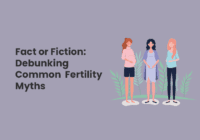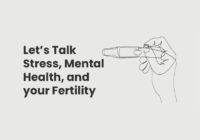Becoming a parent is one of the greatest joys life can bring. Once you experience parenthood, it’s natural to start thinking about the future.
Deciding on the number of kids you want to have is one of the most important decisions you’ll make about your family and lifestyle. And if you’re like most families, you’ve probably considered the best age gap between your firstborn and subsequent kids.
Although there is never an “ideal” age gap between kids, family planning is always a very personal decision. Parents usually consider their age and health, as well as their finances and careers.
However, if getting pregnant is not as easy the second time around, it’s normal to feel concerned about how this might impact your plans to grow your family.
Often, those who never experienced difficulty conceiving their first child might not even consider the possibility of secondary infertility.
What is Secondary Infertility?
Secondary infertility occurs when you’re unable to become pregnant or to carry a baby to term after previously giving birth to a baby. Experiencing infertility means that you’re unable to conceive after one year or longer of unprotected sex.
Approximately 1 in 7 couples in Canada experience secondary infertility. Meanwhile, about 1 in 6 couples who never had a child experience infertility.
Secondary infertility accounts for approximately 30% of all infertility cases, says Dr. Tanya Williams. Besides the strain of personal failure, these couples are often exposed to a number of family, cultural and social pressures.
“Patients often believe that if it was easy for them the first time, it should also be easy when they are ready to try again,” points Dr. Williams. This is one of the many reasons why secondary infertility can be particularly stressful for families – it tends to catch people off guard.
Some of the challenges couples face when they are having difficulty conceiving the second or third child include heartbreak, grief, loss of control in your life, particularly if their plan involves a definite gap between their children or having another child with your new partner.
Often family and friends don’t understand and can be insensitive without knowing. Dr. Williams highlights that it is important to acknowledge your feelings, talk it out, spend quality time with your child, and connect with your partner.
Why Am I Experiencing Secondary Infertility?
If conceiving baby #2 is more complicated than you initially expected, consider the different things that might have changed since your first child was born.
The factors affecting secondary infertility are the same as the factors of primary fertility. You and your partner’s age, weight, diet, exercise, lifestyle, stress levels, or pre-existing and new medical issues all impact your ability to conceive.
The Emotions of Secondary Infertility
It’s important to remember that experiencing infertility is often an emotional rollercoaster. Having one child won’t change the usual feelings of anxiety, envy, or anger infertility often brings.
Unfortunately, well-meaning acquaintances or loved ones might not realize that asking someone about their plans to grow their family is not an appropriate question.
Meanwhile, if you’re open about your struggle to conceive or your experience with miscarriage, your support system might not understand the grief of secondary infertility.
And once your little one reaches a certain age, the chances are that they’ll start asking about having a little brother or sister. This conversation can be particularly hard to navigate with your child.
These are some of the many reasons why families who experience secondary infertility wrestle with feelings of guilt.
If you’re having trouble getting or staying pregnant for the second time around, you might be asking yourself questions such as:
- Why can’t I be grateful for the child I do have?
- How would I feel if we have a single-child family?
- Should we have started trying to conceive earlier?
- Is it too late for me to get pregnant again?
Know that these feelings are normal and that pregnancy isn’t easy for a lot of couples. If you need additional support during this time, talking to a mental health professional is often beneficial for many families.
When to See a Fertility Specialist
It’s time to talk to your doctor if you’re under 30 and haven’t been able to conceive after a year of regular sex without protection. Women who are older than 35 should seek help if they have not become pregnant after six months of trying. Get medical advice even sooner if you have irregular or painful periods or don’t have any periods at all.
Men should talk to their doctors if they have had an injury or surgery on their testicles, experience premature ejaculation, or lack erections. Both men and women with a history of sexually transmitted infections should see their doctors if they’re having trouble getting pregnant.
Here at Dr. Tanya Williams Fertility Centre, our patients’ needs and well-being are always our top priority. If you’re experiencing secondary infertility and want to explore the best ways to grow your family, download our patient referral form. Our record of success reflects our commitment to excellence, and we look forward to helping you take the next step in your fertility journey.







